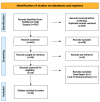Diagnostic and Prognostic Ability of Pancreatic Stone Protein: A Scoping Review
- PMID: 38892234
- PMCID: PMC11172959
- DOI: 10.3390/ijms25116046
Diagnostic and Prognostic Ability of Pancreatic Stone Protein: A Scoping Review
Abstract
Pancreatic stone protein (PSP) is an acute-phase reactant mainly produced in response to stress. Its diagnostic and prognostic accuracy for several types of infection has been studied in several clinical settings. The aim of the current review was to assess all studies examining a possible connection of pancreatic stone protein levels with the severity and possible complications of patients diagnosed with infection. We performed a systematic search in PubMed, Scopus, the Cochrane Library and Clinicaltrials.gov to identify original clinical studies assessing the role of pancreatic stone protein in the diagnosis and prognosis of infectious diseases. We identified 22 eligible studies. Ten of them provided diagnostic aspects, ten studies provided prognostic aspects, and another two studies provided both diagnostic and prognostic information. The majority of the studies were performed in an intensive care unit (ICU) setting, five studies were on patients who visited the emergency department (ED), and three studies were on burn-injury patients. According to the literature, pancreatic stone protein has been utilized in patients with different sites of infection, including pneumonia, soft tissue infections, intra-abdominal infections, urinary tract infections, and sepsis. In conclusion, PSP appears to be a useful point-of-care biomarker for the ED and ICU due to its ability to recognize bacterial infections and sepsis early. Further studies are required to examine PSP's kinetics and utility in specific populations and conditions.
Keywords: bacterial infection; biomarker; diagnosis; infectious diseases; pancreatic stone protein; prognosis; sepsis.
Conflict of interest statement
The authors declare no conflicts of interest.
Figures
References
-
- Chen X.-H., Huang S., Kerr D. Biomarkers in clinical medicine. IARC Sci. Publ. 2011;163:303–322. - PubMed
-
- Ventura F., Eggimman P., Daix T., Francois B., Pugin J. Pancreatic Stone Protein Measurement to Screen and Diagnose Sepsis in the Context of the Surviving Sepsis Campaign Recommendations. Med. Res. Arch. 2024:11. doi: 10.18103/mra.v11i12.4893. - DOI
Publication types
MeSH terms
Substances
LinkOut - more resources
Full Text Sources
Miscellaneous


